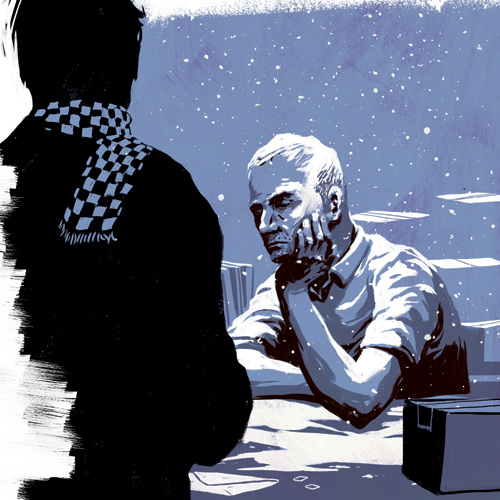
Illustration by Pat Kinsella
It’s 2:30 p.m. on December 23, and I feel awful. I am exhausted, and my heels and lower back feel as if someone is driving hot, dull knives into them. I have been on my feet since 5:30 a.m., working a retail window at the post office, and an unending line of people before me are looking to mail Christmas letters and packages. I try to hide my discomfort, and I try not to think of the five long days between now and my next day off.
Twenty-four hours earlier, I was in Colorado’s Never Summer Range, not this drab government building. Instead of with customers, I was with two friends, Brian and Doro. I was wearing a uniform of sorts, Gore-Tex and ski boots, not polyester pants and a name-tagged polo.
Twenty-four hours earlier, I was dropping in for my second run of the day. The snow was waist deep as I looked for openings between the tightly spaced lodgepole pines. Each turn was smooth, powerful, deliberate. The light, pillowy snow broke in waves as I arced through the apex of each turn. I was immersed in the moment, and my world was radiant and beautiful for the two-minute run.
Brian, Doro and I spent seven hours in ski boots that day. The uptrack felt effortless, just easy motions at a smooth, steady rate. At the top of each run, full of excitement and nervous energy, we giggled at the quality of the snow, the absence of other people and the run before us. We whooped and hollered, relishing the surreal sensation of turning through steep terrain covered by light, bottomless snow. Last night, I went to bed tired, sore, content.
This morning, I was up and performing my morning ablutions by 5 a.m. I got to work stiff-muscled and grainy eyed. As the day dragged, my heels and back began to ache, then hurt.
At 5:30, I crawl out of work. I go to an evening yoga class to unclench my twisted body. At home, I fall asleep, hoping to feel better through the next long day of work.
I’ve always found that 24 hours after a hard physical effort—be it a marathon, a bike race or a long day in the skintrack—is defined by a severe physical and emotional crash. Bereft of the prior day’s adrenaline and endorphins, the world is a washed, gray, faded copy of itself. I call this feeling the exercise hangover. Like its booze-fueled counterpart, it leaves me stiff, sore, photosensitive and cranky. The world of work, responsibilities and obligations seems dull and grinding after a day of clarity and wonder.
This is the cost of slipping away for a day or two, or maybe a hut trip once or twice a year. At those times, life seems simpler. For a few brief moments, life is determined by the skintrack’s curve, the snow pit’s layers, the fall line’s pull. Skiing doesn’t pay the bills or feed the dog, but I still go out whenever I can. Those brief moments of friendship, natural beauty and clarity give my life meaning.
Despite the aching back and Monday hangover, I keep heading out when there’s snow in the mountains and a willing partner or two. When I get out of bed at dawn on a Sunday morning and start putting my ski gear in the car, I know that I’ll be wrecked come Monday, but I don’t think about it. It’s time to go skiing.
—
To get the December issue, visit the Backcountry Magazine store.










Related posts:
That Girl: Kt Miller integrates adventure and conservation for a new take on ski photography
Hot smoke, cold smoke: Wildfires burn both ways on the heels of a destructive season in the Northwes…
Snow Shooter: Jason Hummel
Snow Shooter: Blake Jorgenson